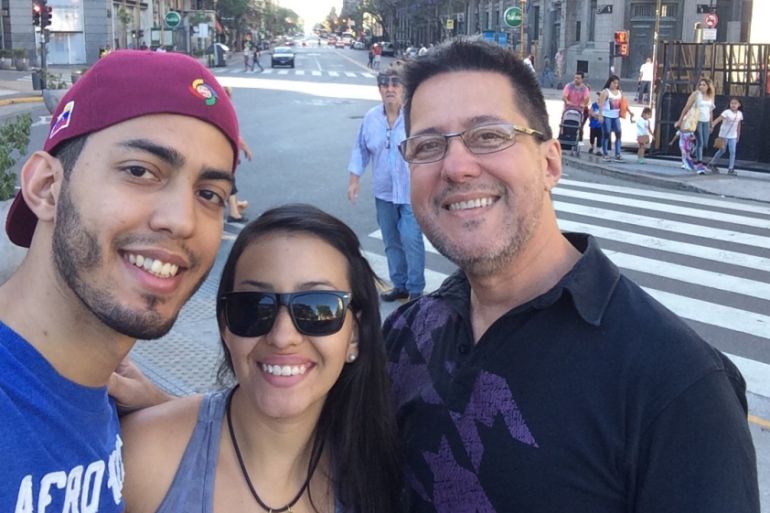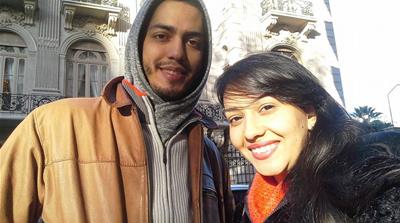Battling adversity: The Venezuelans living in Buenos Aires
More than 31,100 Venezuelans now hold Argentine residence as droves flee the country’s economic crisis.

As Venezuela’s economic collapse continues to affect millions in the country, Argentina has become a destination of choice for those fleeing the crisis – unlike neighbouring nations that have slammed the door shut.
Miguel and Alexa Rodriguez are a Venezuelan couple from Caracas who arrived in the capital of Argentina, Buenos Aires, in January 2015.
“The insecurity more than anything motivated me to leave,” said Miguel, 29, of the ongoing Venezuelan crisis, now in its sixth year. “After the political crisis began to worsen, we saw our decision to leave was correct.”
The complex political and socioeconomic situation in Venezuela has increased the number of Venezuelans seeking asylum abroad by 2,000 percent, with many citing insecurity and violence, a lack of food, medicine, and access to social services and a loss of income as the driving forces to leave, according to the UN Refugee Agency.
The couple are two of the 31,167-strong Venezuelan diaspora with Argentine residency. Before the Venezuelan crisis began in 2011, there were only 1,510 in the country.
Both left stable jobs – Miguel in sales and Alexa as an administrative assistant – as the economic collapse hit the country. The Venezuelan currency has lost more than 90 percent of its value, according to local media.
“The minimum wage doesn’t go far at all in Venezuela. It’s impossible. The minimum wage here isn’t much, but at least you can [afford] rent,” said Alexa, 28.
The couple lived off their savings as they began searching for work in Buenos Aires.
Personal challenges
“When you leave your level of comfort, which is what happened to me when I left Venezuela, it means leaving your family, your loved ones, your little cousins – everything – and starting life again,” said Alexa.
 |
| The couple back home in Haltillo, Venezuela [Courtesy of Miguel and Alexa Rodriguez] |
Miguel eventually convinced his parents and brother to join him in Argentina’s capital in September 2016, but Alexa’s parents, both in their 60s, still live in Venezuela.
“It’s been two years since I saw my dad. It’s very hard, especially as the situation which they’re going through is not nice at all. They don’t have a quality of life, and that’s what hits me the hardest – and they’re at the age they should be enjoying themselves, their life, and I know they’re not,” said Alexa.
The poverty rate in Venezuela is at about 85 percent, food scarcity affects most of the population, and inflation is predicted to exceed 13,000 percent, according to the International Monetary Fund.
The improved situation in Argentina allows Alexa to regularly send remittances home to her family. “Being here I help my parents more.”
Because of the situation back home, many Venezuelans are increasingly choosing to head to Argentina and other neighbouring countries.
Argentina’s response
Argentine President Mauricio Macri has been critical of the Venezuelan government. “We will help where we can so it [Venezuela] can come out of this social, political and economic conflict,” he said last year.
Argentine law allows foreign nationals entry into the country “when there are exceptional reasons of a humanitarian nature”.
The Argentine government’s leniency towards Venezuelans comes at a time when Brazil and Colombia have sought to tighten their borders, according to local media.
Local view
“My opinion is that Argentina has always been very generous, not only to Venezuelans,” said Leonardo Ledesma, a builder from Santa Fe.
Venezuelans are now the third highest number of migrants with Argentine residence – behind Bolivians and Paraguayans.
“Despite the fact that we are also experiencing a crisis, foreigners can easily settle down, access basic services, as well as healthcare and education,” said Emanuel Franco, a government assistant for Santa Fe province.
The perceived crisis in Argentina relates to the economic situation with inflation at 19.2 percent, according to the IMF, causing protests.
 |
| The couple in Buenos Aires [Courtesy: Miguel and Alexa Rodriguez] |
But Jorge Luis Guaymas, a Buenos Aires landlord, does not share the same view as the Argentine government.
“I live at the side of a building where at least 30 families are Venezuelan,” he told Al Jazeera.
“Argentina isn’t prepared for mass immigration; we already have overpopulation, inflation and crime,” he said. “We should be more careful about leaving the national borders open.”
Miguel has encountered different reactions from locals.
“There are people who receive you with open arms, and there are others who are a bit xenophobic,” he said.
Overcoming challenges
At the start, it was a struggle professionally for the advertising graduates, who tried to find work in their field in Argentina.
 |
| Both graduated in 2013 [Courtesy: Miguel and Alexa Rodriguez] |
“All of our experience we gained in Venezuela didn’t convince them to give us a job in such a competitive field,” said Miguel.
Despite the setback, Miguel has worked his way up from being a kitchen porter to eventually become head chef.
Alexa went from waitressing and now splits her time between a personal project designing lingerie and working in telesales.
The couple say they intend to go back to Venezuela when the situation improves.
“We have been able to grow much more than in Venezuela as people. When we go back to Venezuela we’re going to have a wonderful array of stories to share with people there,” said Miguel.
Divided opinion
Other Venezuelans in Argentina are divided about returning home.
Gioconda Canas left Merida in 2014 to come to Argentina after mass protests turned violent. “[In Venezuela] my mobile phone was stolen, they stole my computer, and they even tried to steal my car,” she said.
Gioconda left just before finishing her university degree and now works as an animator in Buenos Aires.
“I’m not a pessimist, but I feel the process for Venezuela to return to normality is very long. It doesn’t just mean the current government leaving power – there’s a lot to consider,” she said.
“I feel with my personal projects that I have here, I wouldn’t return to Venezuela – and I don’t feel within 20 years that the situation will improve that much.”